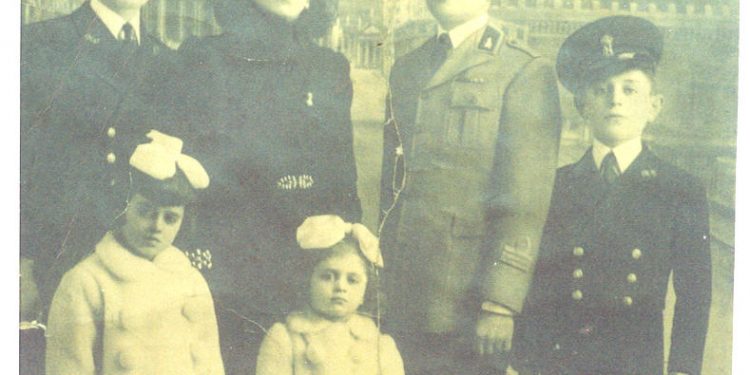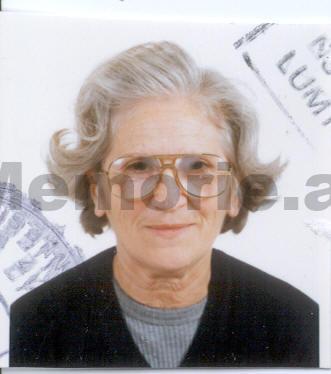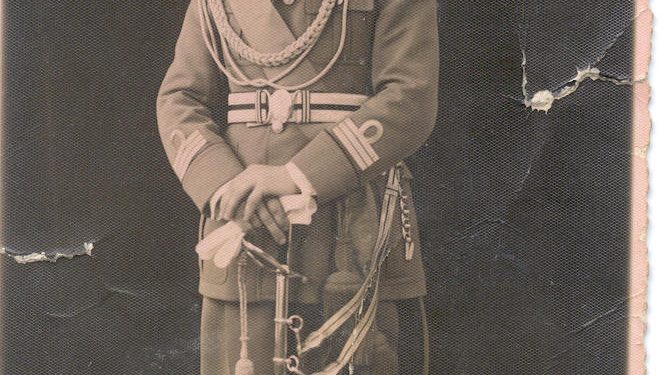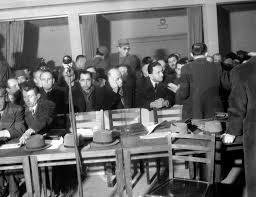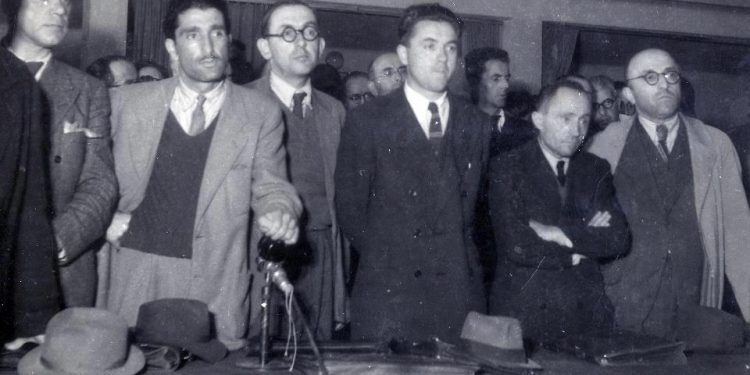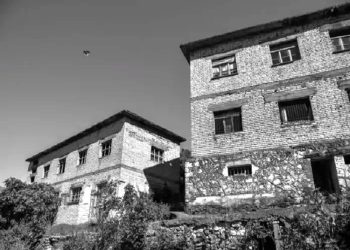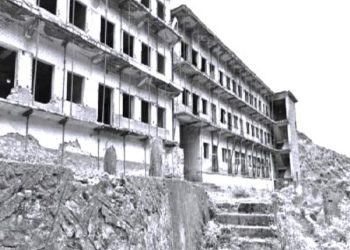Dashnor Kaloçi
Memorie.al publishes the unknown story of Colonel Bajram Pustina, former senior military of the Zog Monarchy, who during the years of Nazi-Fascist occupation of the country, served as a member of the Supreme Military Court, escaping execution more than 36 dangerous communists who were kept under arrest, such as Gani Strazimir, Manol Milo, Sul Baholli, Qibrie Ciu, Tasim Shehu, Emin Koçi, Bedri Çeliku, Harrilla Bakalli, etc. The story of her daughter, Vera Pustina (Nepravishta), about the communists’ ingratitude towards her father who suffered 17 years in Burrel prison….
Among the most famous people that our father, Colonel Bajram Pustina had saved during the War, were Sul Baholli, Manol Milo and Qibrie Ciu. The father put Sula under the bed in Tasim Shehu’s house where he had gone to hide and told the Germans that there was no one there except the old woman. But all that our father had done was not considered at all by the communists who arrested him in early December 1944 and, after initially sentencing him to death by a special court, rotted him in Burrell Prison, by where he came out only in 1962, from which he had an incurable disease and died two months later. This is what Vera Pustina (Nepravishta) testified a few years ago, who told the whole painful story of her father, Colonel Bajram Pustina, one of the senior soldiers of the Royal Guard of Zog, who during the Nazi-fascist occupation of the country, at the request of his friend, Prime Minister Fiqëri Dine, he briefly served in the Supreme Military Court in Tirana, escaping the bullets of over 36 dangerous communists being held in custody.
Who was Bajram Pustina?
Bajram Pustina was born in 1897 in Sheher of Dibra e Madhe, in one of the most famous families of that province, where his father Aliu and grandfather, Nurçe Pustina, were two of the people who had a great fame not only in that area, but also throughout Northern Albania, for the wars they had waged against the Turks and Serbo-Montenegrins. In order to escape the repeated persecutions of the Serbs, at the beginning of 1915, Ali Pustina’s family moved from their lands and came and settled in the city of Tirana with the family of Qazim Keçi. Regarding this and Bajram Pustina’s subsequent military career, his daughter, Vera Pustina (Nepravishta) said: Our father Bajram Pustina gained the right to continue the Officers’ Training School that was opened at that time in Tirana. From 1915 when he first wore the military uniform and throughout his career, including the period of the Zog Monarchy where he served in the Royal Guard until the end of 1944 when he was effective in the Albanian National Army, no never interfered in the affairs of politics, but carried out only his duty, in accordance with the laws in force. The father gained the rank of lieutenant colonel there from 1938 and on April 7, 1939, when fascist Italy carried out military aggression against our country, the father was sent to maintain order in Tirana Prison. The day after the father contacted his superiors who told him that everything was over, he ordered the prison to be opened so that the convicts would not fall into the hands of the Italians. In the days following the seventh of April, the father went for some time and hid in Greater Debar, and when the call was made for all the military to return to their duties, he returned to Tirana and the General Command appointed him to the city. of Vlora where we stayed with family for two months. After two months, the father was transferred to go to Rome as a representative of the Tirana government for Albanian students attending military academies in Italy. The father remained in that position until June 1943, and seeing that Italy was capitulating, he requested to return to Albania. That request was approved and within that month, the father and mother, Hyrije Shehu and the four children (Fisnik, Ylberi, Bukuria e Vera) returned to Tirana with their families “, Vera Pustina recalled about the past and career of her father, Bajram Desert, both during the time of the Monarchy and the War period.
Arrest by the communists
After the capitulation of Italy, Bajram Pustina served again in the Albanian National Army and in 1944, at the request of his friend, Prime Minister Fiqiri Dine, he accepted the position of member of the Supreme Military Court in Tirana. Regarding this period, his daughter Vera, said: “Although in that very delicate task the father stayed only for a short time, he managed to save about 36 people, freeing them from the courtroom, most of whom were communists. Also, on the night of February 4, 1944, when the Germans had begun mass raids and shootings, my father went to the house of Gani Strazimir, which was an important communist base, and there he was able to escape from the Germans, Gani and his two brothers Rushiti and Siriun, as well as some of their other cousins who were in that house that night. But among the most famous people his father had saved during the war were Sul Baholli, Manol Milo and Qibrie Ciu. The father put Sula under the bed in Tasim Shehu’s house where he had gone to hide and told the Germans that there was no one there except the old woman. But all that our father had done was not considered at all by the communists who arrested him in early December 1944 and after initially sentencing him to death by a special court, where they called him a “war criminal”. rotted in Burrell Prison for 17 years. “My father was released from that terrible prison only in 1962, after he had an incurable disease and died two months later”, Vera Pustina recalled about her father Bajrami, the famous colonel, who saved dozens of communists during the occupation. from prisons.
Sul Baholli did not help
What happened to Bajram Pustina’s family after his arrest and how was she treated by the communist regime of Enver Hoxha? Regarding this, the daughter, Vera, testified: “After the arrest of the father and his sentence by the Special Court, we had our house confiscated, but we were not removed from Tirana like many other families. We were able to stay there on Qemal Stafa Street by building a shelter in the yard of the existing house. Then the four of us children grew up and barely left us to finish high school, as the evil shadow of the class war haunted us everywhere. Worse than us, was our sister, Beauty, who lived in the basements of the Shallvars where all the sewage was poured into the room where she lived. Unable to bear the scandalous situation she was in, in 1974 she went to the Executive Committee and came forward and asked for help Sul Baholli, who was introduced as the daughter of Bajram Pustina. Sula, who had escaped being arrested by the Germans only thanks to our father, said to Bukuria: “I have nothing to do, because I have nothing in hand” and left immediately without saying another word. “Beauty continued to live in that basement where, due to extremely bad conditions and savagery, she got rheumatism in her heart and died”, said Vera Pustina, the daughter of Colonel Bajram Pustina, who, although he had saved many communists from the bullet during the war, spent 17 years in Burrell Prison.
Special Court
Despite the brilliant defense of the renowned lawyer, Dr. Spiro Stringa, Colonel Pustina ended up in Burrel
Colonel Bajram Pustina was one of the former senior officials of the Albanian wartime governments, who was arrested and taken to the Special Court that took place in February-March 1945. In that trial, Colonel Pustina was defended by the famous lawyer, Dr. Spiro Stringa, who in the defense of his client, among other things, said: “Bajram Pustina is accused of having served in the enemy army and of being a member of the Political Court. He is also accused of embezzling a quantity of material during his service. In fact, the activity of the defendant Bajram Pustina is negative, because he did not carry out any activity for the benefit of the enemy. After arriving in Italy, Bajram Pustina followed the fate of all Albanian officials. Sent to an all-Italian Company of the Arezzo Regiment, in which there is no value, because others ordered and commanded. Later, he was sent to the Royal Guard in Rome, as an officer of the Matrix, in which a non-commissioned officer was to be sent, but he was assigned ay, how and how to remove him from any responsibility. Not wanting to stay in Rome, he asks to be transferred to Albania and becomes available to the Military Distretto, and during this stay no call is made for weapons. This is the activity of Bajram Pustina during the Italian occupation. No fact and no indication came to light to aggravate the position of the defendant, so that he would have damaged the interests of the Homeland, so that the accusation is not justified, with not even any act of cooperation, in the true and Bajram Pustina, in favor of the occupier, after the special law for cooperation with the occupier, does not have the shallow meaning that he wants to accuse, but that he intends to write all the powers in his favor. of the occupier, and especially initiative of action, which is completely missing in Bajram Pustina. Regarding the activity of the defendant as Antar Gjyqi, this activity not only does not burden him with any responsibility, but on the contrary is in his favor, since he has always tried to facilitate the position of each defendant. In this regard, the facts speak for themselves: During his tenure as Antar Gjyqi, about 70 defendants were sent for trial, of which 40 were acquitted, while 20 were sentenced to pre-trial detention and 10 to prison sentences. different. Among these defendants, we mention Emin Koçi, accused of killing two spies in Shëngjergji Street, for whom the Prosecutor had requested the death penalty, and he was acquitted; we mention Harrilla Bakalli, one of the National Liberation Movement of Durrës, for whom the Prosecutor had requested the sentence, but was acquitted; we mention Bedri Çelik accused of being a member of the Movement, and of participating in various clandestine meetings, for which the Prosecutor had sought punishment, and he was acquitted. These facts, Judges, you have the opportunity to check in the archives of the former Military Court. The National Defense Command, as well as the Ministry of Interior, seeing such an activity in favor of the defendants, have been forced to intervene often and to warn the Trial Panel, as the defendant himself points out. another Ded Jakova. The best fact, we find that no denunciation or complaint is bamun from the people against the defendant, on the contrary, in his file, there are many favorable statements. It should be noted that the defense witnesses, and especially the witness Mr. Lawyer Dhimitër Goda, strengthen what was submitted above, by proving that the defendant Bajram Pustina, together with his colleagues have behaved very well and very gently towards the defendants. Regarding the trial of the late Kol Lakos, sentenced to death for the murder of Idhomeno Kosturi, and that the accusation has been presented as evidence against Bajram Pustina, it does not seem to me that this trial can aggravate the position of the defendant. This fact becomes evident if the trial in question is studied, because no matter how much the late Kol Lako pleaded not guilty before the Trial Panel, but during the trial, there was a lot of evidence and clues about his guilt as a murderer. . The statement of Bajram Pustina, we made before Mr. It does not matter that the late Kol Lako had claimed the murder of the late Idhomene Kosturi, it should not be appreciated in his favor, because it is impossible for a Judge, or any other clerk, to be able to accurately remember any of his official activities he has carried out. It should not be forgotten, apart from this fact, that when a defendant lies about a charge, he loses his cool-blood and judgment, and, driven by the instinct of self-defense, uses every means for this purpose, so it must in substance be examined the whole issue. Under these spiritual conditions, it is easy to explain the above-mentioned statement of Bajram Pustina that we made before Mr. Regarding, finally, a report with which some officers accused the defendant of misappropriation of material, we say that this report is refuted in itself with the fact that the defendant Bajram Pustina had nothing to do with the use of materials. Therefore, for the above-mentioned reasons, I request that Bajram Pustina plead not guilty, and otherwise any eventual punishment that may be given to him be proportional to the guilt that may have been committed, but ultimately this punishment as well. is amnestied, based on the amnesty dated 28 November 1944.
Lawyer Dr. Spiro Stringa March 1945
How the communists retaliated against those who helped them in the war
Colonel Bajram Pustina, the former senior military officer of the Royal Zog Zog, who during the years of Nazi-Fascist occupation of the country served briefly as a member of the Supreme Military Court in Tirana, even escaping the bullet of over 36 extremely communist dangerously being held captive, he was not the only high-ranking official of the time of the occupation to prove on his shoulders the Communists’ ingratitude for what he had done for them during the War years. The list of those former high-ranking officials who during the years of occupation of the country (1939-1944), used their posts to help the communists, is quite long, but among the best known in their “charities” have been: Former Mayor and Prefect of Tirana, Qazim Mulleti, former Chief of Tirana Police, Sulejman Kukaleshi, former Commander-in-Chief of the Albanian Gendarmerie, Hysni Peja, former director of Tirana Prison, Rrok Berisha, etc. But one of the most “xhymert” in this regard has been Qazim Mulleti, former mayor and then the Prefect of Tirana in the years 1940-1943, who with the intervention of his many friends (especially the old tyrants), during the period of his duty as prefect of Tirana, he was released from prisons or escaped from being shot, with dozens of dangerous communists, even assassins. Among those who benefited from the generosity of Qazim bej Mulleti, were: Ramiz Alia, Nako Spiro, Abdyl Këllezi, the wife of Ramadan Çitaku, to Besim Levonja, (author of the famous comedy “Prefect”) whom Qazim Mulleti released from the cells of the Tirana political prison as a poor man. For the release of Ramiz Alia from the prison of Tirana, Qazim Mulleti was intervened by his brother, Hakiu, because his wife (from the Muka tribe of Shkodra), was a close cousin of Ramiz Alia. Regarding this event, former President Alia, many years later thanked Qazim Mulleti’s nephew, expressing his gratitude. After Qazim Mulleti, the Chief of Tirana Police, the famous Man Kukaleshi, has done many honors by releasing from prison many dangerous communists. One of them was also the sister of Agron Çorati (one of the most famous communists of Tirana), who took part in the kidnapping of Man Kukalesh’s daughter, Ikbale. In that case, Man Kukaleshi, not only did not take revenge for that event, but whenever Agron Çorati and his two sisters were arrested by the Italians, Mani intervened and released them from prison. Agron Çorati’s two sisters, Mila and Vanda, have publicly stated this in the press after the 1990s. After Mullet and Kukalesh, Hysni Peja was also known for his “charities” to the communists, so much so that he was considered their “fifth column” in the ranks of the Albanian Gendarmerie. In addition, the former director of the Tirana prison, Rrok Berisha (originally from Kosovo), who in 1944, opened the Tirana prison, releasing all the prisoners who were being held, was also very well known in this regard. there and went to the mountain with them coming out partisan. But all these honors were forgotten by the communists, and most of the former high-ranking officials who had helped them during the war were executed or ended up in prisons and internments./Memorie.al




